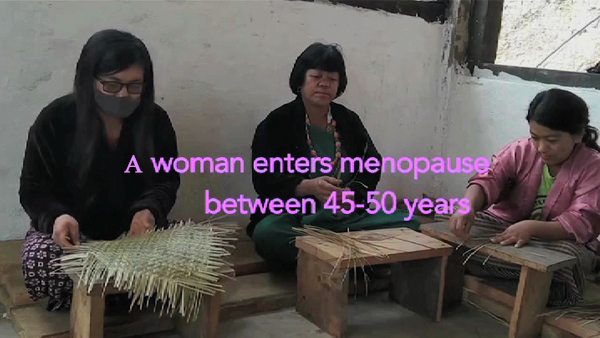 Menopause is a natural life event that every woman experiences. It is a time that marks the permanent end of a woman’s menstrual cycles. And during this transition, women go through emotional, mental, physical and social changes impacting their daily lives.
Menopause is a natural life event that every woman experiences. It is a time that marks the permanent end of a woman’s menstrual cycles. And during this transition, women go through emotional, mental, physical and social changes impacting their daily lives.
But despite being a progressive country, Bhutan has never seen any discussion around menopause on formal platforms so far.
Perhaps, this could be the reason why many women lack self-awareness and self-acceptance when they hit menopause.
So, organisations promoting women’s welfare, find it timely to raise public awareness on menopause and empower women to embrace that phase.
In South Asian countries including Bhutan, a woman reaches menopause between the ages of 45 to 50. It is an inevitable stage in a woman’s reproductive life that happens with several symptoms.
“Twenty-five to 30 per cent have hot flashes. They feel heat in the face which spreads to the neck and this will last two to five minutes. After that, they have intense sweating. Some are unable to sleep, some have palpitation, some even have depression due to drop in hormone and some have repeated urinary problem. Since their menstruation stop, they cannot become pregnant. Women’s bone becomes very thin,” said Dr Ugyen Tshomo, a Gynaecologist at the national referral hospital.
Mood swings, sagged skins, weight gains, lack of interest in physical intimacy with spouses, and body aches are some other menopausal symptoms.
“After menopause, we are also at risk of getting a heart attack. Women should have proper check-up, whether they have blood pressure or diabetes. Then, they must do a pap smear and in the west, they do mammography for breast cancer. So just because you are in menopause it doesn’t mean you don’t visit the hospital. So you have to continue to look after yourself and be physically active also to prevent some of the diseases,” Dr Ugyen Tshomo added.
But due to a lack of self-awareness amongst women, gynaecologists come across women, who misunderstand symptoms of menopause for some other ailments.
“They go to other doctors where they are investigated for tuberculosis and so many other diseases. Some also go to psychiatrists because they have depression. They should come to us instead of going to other doctors because it is a waste of time. These women need hormone replacement therapy, so only we can give that,” Dr Ugyen Tshomo said.
Psychiatrists too agree that most women are unaware of what happens to them when they hit menopause.
“We ask their symptoms and see whether it is a clinical disorder or an adjustment disorder because, after menopause, women’s life changes physically, emotionally and socially. So we advise them they are going through menopause and these symptoms have nothing to do with cancer and all,” said Dr Chencho Dorji, a Senior Consultant Psychiatrist at the national referral hospital.
The RENEW, a civil society organisation, focusing on women empowerment says there is no official data or study available about menopause in Bhutan. However, it assumes only 10 per cent of educated women understands menopause and its symptoms.
Describing her own experience of going through menopause, the Executive Director of RENEW, tells self-awareness and mental preparedness are key to help women adapt to menopause.
“Now as years rolled by, we have realised that this menopause is also one of the priority public health areas that we need to advocate in order to prevent domestic violence and gender-based violence. Why I am saying this is because this is a very important stage in a woman’s life and you don’t realise it and that is the time when women go through many mental health issues,” said Tshering Dolkar, the Executive Director of RENEW.
She says without understanding the impacts of menopause, illiterate menopausal women can lose focus on being productive homemaker, while educated ones might see limitations in their careers.
The RENEW and other stakeholders also share that men should know about women’s menopausal stage as this will help them look at the issue with empathy and compassion.
“Most men are unaware that women go through menopause and that is the triggering factor that can cause barriers between relationships. So when women go through menopause, they suffer from depression, confused and if you are not aware of this, it is difficult for your partners, friends and relatives to accept,” added Tshering Dolkar.
“Men should be included in the menopause discussion because they play an important part in women’s life. And I am saying this because at the age of 45 or 50 you are no more 25 and your looks degrade,” Dr Chencho said.
That aside, some women at the decision-making level, especially parliamentarians view menopause as a critical woman health issue that needs support and attention from the government.
National Council’s Eminent Member, Tashi Wangmo is extremely vocal about women related issues. She has never shied away from highlighting them in the parliament sessions. She says parliamentarians can start the conversations on menopause during constituency visits, so that rural women are prepared and empowered to accept the menopausal phase in their lives.
As a focal agency handling public health issues, the health ministry says it has developed an advocacy programme on menopause. But, considering that there is little or no awareness about the subject, more programmes and initiatives need to be implemented.
https://www.facebook.com/133972516617260/videos/313927853627095
Pema Lhaden/ ChoniDema







